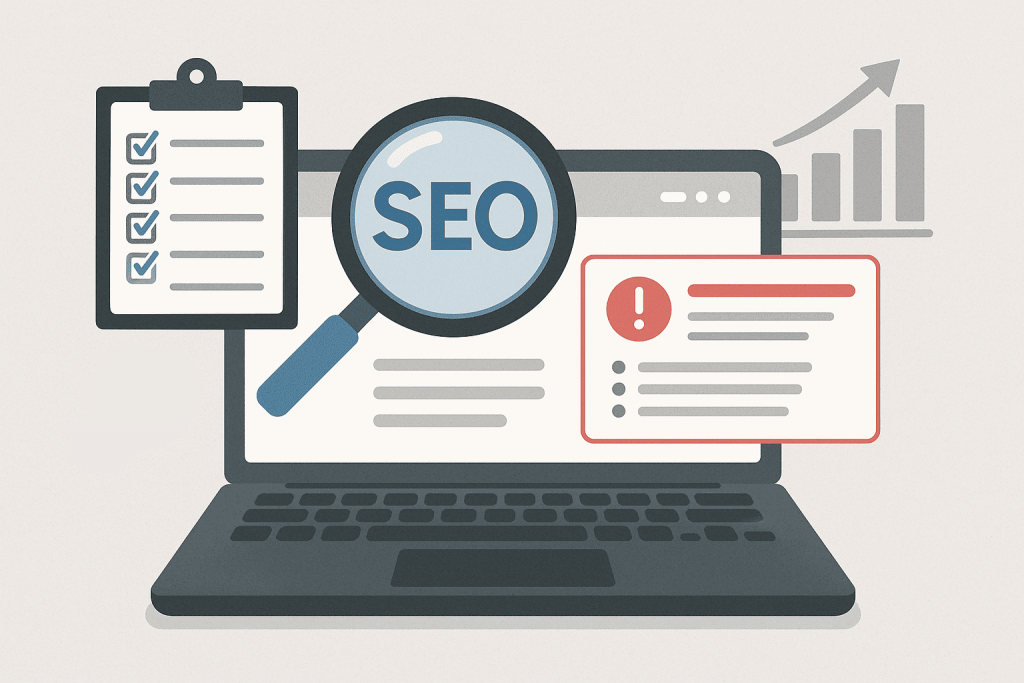
Website optimization for search engines is a never-ending process. Even if your site looks perfect, publishes high-quality content, and has a user-friendly structure, it may still contain technical or content-related issues that prevent it from ranking high on Google. That’s why regular SEO checks are essential for every website owner. And the best part — you can do it for free, without spending money on complex professional tools.
Why SEO Audits Matter
Search engines rank websites based on hundreds of factors — from loading speed to the structure of headings, meta tags, and mobile compatibility. If even one key element works incorrectly, it can affect how your site is perceived by search algorithms. For example, pages without meta descriptions might not appear in search results, and duplicate content lowers your site’s authority. An SEO audit helps you see your website through the eyes of search engines and understand what exactly needs fixing. It’s like a car inspection — you can drive without it, but sooner or later, problems will catch up with you.
Where to Start
The first step is checking indexing. You need to make sure search engines can see all your pages. To do this, review your robots.txt file and sitemap (sitemap.xml). If they’re configured correctly, Google can crawl your content without issues. Next, check for technical errors — for example, non-existent pages (404) or incorrect redirects. Such details create a bad impression not only for users but also for search engines. Free tools can show whether your site has broken links or accessibility problems.
Another important factor is page loading speed. Even the most beautiful website will lose visitors if it takes longer than three seconds to load. Search engines take this into account because it directly affects user experience. A speed test will help you understand which elements need optimization — images, scripts, or server configurations.
Content and Metadata
SEO is not only about technical factors — it’s also about the content itself. Texts should be unique, logically structured, and useful to readers. Free content analysis tools can help identify duplicate texts, missing keywords, or improper heading usage. Pay special attention to meta tags — title and description. They affect not only your ranking but also how your page appears in search results. If these tags are filled out randomly or duplicated across different pages, it’s worth fixing.
It’s equally important to check heading structure. If a page has several H1 tags or none at all, the search engine may fail to understand what the page is about. A logical hierarchy of headings (H1, H2, H3) makes the content clearer both for users and for search crawlers.
External Links and Mobile Optimization
SEO issues often hide not only within the site but also in external factors. For example, if your site has many backlinks from suspicious sources, it can harm your reputation. Free tools can help assess the quality of your backlinks and detect potentially harmful ones. If you find such links, you can disavow them using special search engine tools.
Mobile optimization is another critical aspect. Most users today browse websites from smartphones, and if your pages are not mobile-friendly, your rankings will drop significantly. Checking responsiveness helps you understand whether the content displays correctly on various screen sizes, whether elements overlap, and whether it’s convenient for users to interact with your site.
Maintaining the Results
Even after fixing all errors, SEO work never truly ends. Search algorithms evolve, new requirements emerge, and competitors keep improving their sites. That’s why you should conduct audits regularly — at least every few months. This will help you not only maintain but also improve your rankings. Combined with high-quality content, fast hosting, and continuous user behavior analysis, you can achieve steady traffic growth without extra costs.
Conclusion
A free SEO audit isn’t a one-time promotion — it’s a real opportunity to keep your website in good shape. By paying attention to even basic aspects — speed, structure, content, and usability — you can achieve impressive results without major investments. Remember, technical optimization is impossible without reliable hosting: the stability of your servers, their response speed, and uninterrupted performance determine how fast your pages load and how search engines evaluate your site. A successful website isn’t the one with the most expensive ads — it’s the one that’s clear, user-friendly, fast, and stable thanks to the right hosting choice, and therefore trusted by search engines too.

Leave a Reply